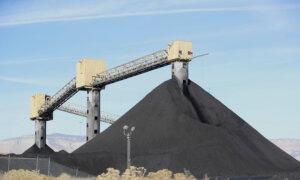The president issues executive actions designed to revive 19th century industrial mainstay to power 21st century economy.
“This is a very important day to me because we’re bringing back an industry that was abandoned despite the fact that it was just about the best, certainly the best, in terms of power, real power,” Trump said in the White House before he signed four executive actions Tuesday on a stage shared with about 15 helmeted coal-miners in overalls.
Those predecessor actions, eliminating more than 200 rules, regulations, and executive orders issued under the Biden administration, enabled the three coal-related orders issued Tuesday, which grant regulatory relief to 47 companies operating 66 power plants, “making them available for coal production almost in the immediate future,” Trump said.
“We’re slashing unnecessary regulations that targeted the beautiful clean coal,” the president said. “We will rapidly expedite leases for coal mining on federal lands … and we’ll streamline permitting. We will end the government bias against coal.”
Trump, after personally greeting nine senators and a dozen House representatives—all Republicans, most from energy-producing Rocky Mountain states—said he would authorize the use of the Defense Production Act under his national energy emergency declaration “to turbocharge coal-mining in America.”
The president also pledged that his administration “is going to do something that’s very different. This was my idea from about 15 minutes before I got up here. We’re going to give a guarantee that the business will not be terminated by the ups-and-downs of the world of politics“ by ”making it hell” to rescind approvals for coal operations.
Under the orders, coal is defined as a “mineral,” not as a “nonrenewable fossil fuel.” Coal is an organic sedimentary rock formed from compressed plant matter over millions of years, not geologically considered a mineral.
The orders direct federal agencies to identify coal resources on federal lands, lift barriers to coal mining, and prioritize coal leasing on U.S. lands, requiring Interior Secretary Doug Burgum to “acknowledge the end” of an Obama-era 2008 moratorium that paused coal leasing on federal lands.
The orders direct all federal agencies “to end all discriminatory policies against the coal industry” and promote grid reliability by ensuring grid policies are not based on progressive policies that “discriminate against secure sources of power, like coal and other fossil fuels.”
Under the orders, the Department of Justice is instructed “to vigorously pursue and investigate” anti-fossil fuel state policies that are considered illegal or unconstitutional, while federal agencies must promote coal and accelerate development of coal technologies.
Coal-fired power declined more than 2 percent in 2024, continuing a decades-long decline. Coal generated 50 percent of the nation’s electricity in 2005 but just 14 percent in 2024, according to the report.

A coal miner walks past mining equipment at the Sufco Coal Mine, 30 miles east of Salina, Utah, on May 28, 2014. George Frey/Getty Images
Coal Retirements Halted
As of March 2024, the United States coal mining industry employed more than 33,000 people, slightly more than half it did in June 2022, according to the U.S. Bureau of Labor Statistics, which, by comparison, notes solar energy employed nearly 280,000.
In March, EPA Administrator Lee Zeldin announced he was reviewing both “power plant rules” under the president’s energy emergency declaration with the implied intent to keep them operating.
Many utilities were already exploring ways to keep coal-fired plants operating.
America’s Power CEO Michelle Bloodworth told state and regional utility commissioners during a February policy summit in Washington that since 2022, utilities in 19 states have delayed planned retirements of about 50 coal-fired plants because of “clogged interconnection queues” for natural gas hookups and rising electricity demand.
In October 2024, Wolverine Fuels reopened Utah’s Fossil Rock mine, which had been shuttered for 23 years. Although there aren’t any pending permits to open new coal mines or build new coal-fired power plants, electric utilities are considering extending contracts with coal providers.
Among those projects are permits related to four coal mine operations: two in Pennsylvania, one in West Virginia, and one in Alabama.
The Bureau of Land Management recently approved a southeast Montana coal mine’s waiver from the “soot standards” to expand its operations. On April 2, the bureau agreed to consider Freedom Mine in North Dakota—the nation’s largest lignite coal mine—to extend its operating permit from 2031 to 2045.
“Already under our leadership, the Department of Interior has approved the expansion of the Spring Creek Mine in Montana, supporting 280 coal mining jobs and unlocking over 40 million tons of coal,“ Trump said. ”And there’s more to come in the states of Wyoming, Alabama, Utah, North Dakota, and many others, [including] West Virginia.”
Original News Source Link – Epoch Times
Running For Office? Conservative Campaign Consulting – Election Day Strategies!


